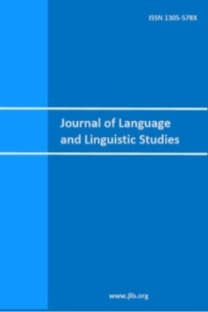Results of the Students' Lecturer Evaluations and Evaluations of Their Own Learning-Outcomes in Accordance with the Bologna Process in German as a Second Foreign Language Program (G2FL)
Öz
Purpose of the Study: While preparing for the Bologna process at our university, student involvement was essential. During the university-wide, end of semester survey, students were asked to evaluate their instructors as well as their individual learning outcomes. Our goal, in the Department of G2FL, was to quantitatively analyze the survey results, the effectiveness of the Department’s language teaching methods and ultimately to ascertain student learning outcomes.Methods: In the first part of the survey, students evaluated their instructors. They answered 15 questions using a five-point scale. In the second part of the survey, they evaluated their own learning outcomes in five language competencies. The data obtained from the students’ evaluation were qualitatively analized by the German Department.Findings: Based on the survey results, the G2FL Department scored higher than the entire university. Most of the students rated themselves good/very good in listening, reading, and writing skills. However, they gave themselves lower marks in the two-way conversation and the oral explanation competencies.Discussions: After the survey, the opinions of 778 students in German Language courses were evaluated by 12 German Language Lecturers. Finally, the opinions of both students and instructors were analyzed by the Department Head.Conclusion: We concluded that our teaching strategy should include a greater emphasis on improving student conversational competency in German. As such, this year-end survey identifies essential learning, concomitantly, the teaching of specific competencies. Once the results are analyzed in detail, they are very useful for improving the quality of teaching as well as learning.
Anahtar Kelimeler:
German as a second foreign language (G2FL), quality assurance, European credit transfer system (ECTS), learning outcomes, Bologna process
___
ALTE - The Association of Language Testers in Europe. (2012). Setting standarts, sustaining diversity. Retrieved on December 1, 2012 from http://www.alte.org. Council of Europe. (2012). Retrieved on December 1, 2012 from http://www.coe.int/t/dg4/linguistic/Cadre1_en.aspEdinsel, K., Gözen, R. & Köktaş, E. (2008). National Conference of Bologna Process. Sakarya, Turkey. Retrieved on November 26, 2012 from http://bologna.kocaeli.edu.tr/sunumlar.php
Fletcher, A. (2012). Meaningful student involvement. Retrieved on December 1, 2012 from http://www.soundout.org/MSIIdeaGuide.pdf
IEU - Izmir University of Economics. (2010). Bologna process at IEU. Retrieved on November 23, 2012 from http://bologna.ieu.edu.tr/en/
IEU - Izmir University of Economics. (2012). ECTS information guide. Retrieved on November 23, 2012 from http://ects.ieu.edu.tr/idari.php?main=1&id=4&lang=en
Yıldız, I. and Aydemir, A. (2009). Bologna süreci ve Dicle Üniversitesi uygulamaları tanıtım sunusu, 3.7.2009. Retrieved on November, 22, 2012 from http://bologna.dicle.edu.tr/sunular.html
YOK -The Council of Higher Education of Turkey. (2012). Bologna process of Turkey. Retrieved on November 26, 2012 from http://bologna.yok.gov.tr/?page=yazi&c=1&i=3
B. Sevinç Mesbah taught German at Hacettepe University, Faculty of Education. Later, she
moved to USA and taught German at Sierra College in California-USA. She also worked
for National Evaluation Systems Inc. as a consultant and tester at the California
Commission on Teacher Credentialing for Single Subject Assessment for Teaching.
She teaches German as a second foreign language at IUE School of Foreign Languages,
Department of German since 2003. She also supervises TELC German certification exams.
E-Mail: sevinc.mesbah@ieu.edu.tr
Bologna Uyum Sürecinde Öğrencilerin, Öğretim Elemanı ve Öğrenme Çıktıları
açısından İkinci Yabancı Dil Olarak Öğretilen Almanca (A2YD) Programını
Değerlendirme Sonuçları
- ISSN: 1305-578X
- Yayın Aralığı: Yılda 4 Sayı
- Yayıncı: Hacettepe Üniversitesi
Sayıdaki Diğer Makaleler
Family Literacy and Second Language Literacy Research: Focus on Language Minority Children
Improving EFL Students' Self-regulation in Reading English Using a Cognitive Tool
Yabancı Dil Öğretiminde Kültürel Unsurların Önemi
Learner Attitudes and Preferences in Terms of Learning Culture
“Cellât ve Ağlayan Yüz” Adlı Hikâyenin Göstergebilimsel Açıdan Çözümlemesi
Perceptions of Pre-service Teachers of English towards Grammar Teaching in the Turkish Context
The Use of Corpus for Close Synonyms
Performance Differences between ELT Freshmen’s Receptive and Productive Skills
